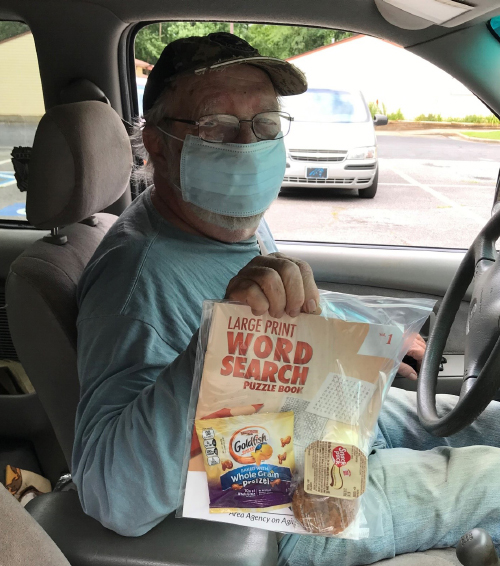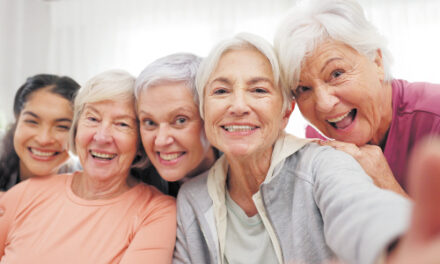Hickory – During the COVID-19 pandemic seniors are more vulnerable and have increased risk, especially those with preexisting health issues. During this pandemic, we are directed to stay at home and practice social distancing, to better protect our health. Social isolation is critical for older adults to follow for the benefit of their health and well-being and at the same time is a major concern for older adults and caregivers who are caring for seniors. Many older adults, especially those who live alone, are dealing with the effects of social isolation. Activities that seniors enjoyed before the pandemic, such as attending group exercise at the senior center, participating in activities at their church, or volunteering, are all things that they cannot do during this time. Staying at home alone and watching the news all day can lead to feelings of depression, anxiety, and feeling overwhelmed.
Staying connected is so important, especially during these times; finding creative ways to stay in touch is critical with helping seniors, as well as caregivers of older adults, get through this particular time. Checking in on an older adult with a simple phone call is a great way to be in touch and help relieve feelings of loneliness. It can also be an opportunity to learn if the senior needs any help with groceries, medications, yard work or other needs. Sending a card or note in the mail is another great way to connect with a senior and let them know you are thinking about them.
While isolation may be necessary during the COVID-19 pandemic – and vital to keeping higher-risk older adults safe – activities and hobbies can help engage older adults and encourage them to have fun. If your loved one enjoys reading, drop off or mail books and magazines they might enjoy. Some older adults like to knit and crochet, work crossword puzzles and do crafts. Try to help them engage with those hobbies, by ensuring they get the supplies they need so they can continue to enjoy their activities.
There are a number of local businesses now offering free delivery service, so it may be helpful to let seniors know about these services and how they can access them. If they do not have access to the internet, you could help them order these items online and have them shipped or delivered. These services take just a little time to help someone receive the things they need, and can relieve stress or anxiety about how they are going to get the things they need.
We also need to remind our seniors to stay home and protect themselves. We know they are anxious to get out of the house and run errands to go shop for items in person, but they need to be reminded of the risks. If we can offer to help our parents, grandparents, or neighbors by picking up items for them or arranging for online orders and delivery, we can lower their risk of exposure.
Staying active and healthy during these times can be challenging, but it is important for seniors to stay active physically and mentally. Offer to meet your senior neighbor or friend outside and take a walk. Instead of focusing on the things they cannot do, help to come up with things they can do, like gardening, reading, or taking a walk. Offer to check out books from the library for them or offer to bring puzzles for them to enjoy.
Many of us experience anxiety over all of the recent unknown or what is next during COVID-19. Beginning a conversation with a senior about what we are all experiencing can be the catalyst for helping ease their minds and assuring them they can express their concerns to you. Discussions about current circumstances and all of the unknowns and reassurance that things will be better once we are past the pandemic can be very helpful. Most of us are hesitant to ask for help, so when calling a senior, it might be helpful to ask open questions to invite a response letting you know they may need help.
Most everyone appreciates having their own independence and understandably will try to protect it at any cost. Acknowledging this and assuring someone that your help can assist with his or her independence as much as possible helps reduce their anxiety. Seniors like to be helpful in return. See if you can find a way that they can help you in return or ways they can help the community like sewing and making masks or calling and checking in on others. These conversations can help someone feel more connected, less isolated and help move things in a positive direction.
Extra precautions should be taken to protect older adults and those with existing health issues. Following the Center for Disease Control’s guidelines as well as local Health Department guidelines is the best place to begin. This includes social distancing, washing hands frequently and wearing face coverings when out in public. Seniors, especially, are “safer at home” and should limit their exposure to others. If you live with an older adult or are a caregiver for an older adult, you and other family members should also limit your exposure to others to lessen risk of infection. Frequent cleaning and disinfecting of surfaces and fixtures in the home is an excellent avenue for keeping your home as safe as possible for the whole family. The North Carolina Department of Health and Human Services updates their website daily to provide valuable information about protecting ourselves, and community resources available.
Our loved ones living in long-term care facilities such as an assisted living or nursing home, have not been allowed to have in-person visits since the pandemic hit. These rules were put in place to protect the health and well-being of these frail, elderly residents. While these restrictions on visitors have helped to limit the spread of COVID-19 in our facilities, they have caused increased isolation among the residents. Family members can arrange for “window visits” where they can visit their loved one, see them through the window glass, and talk on the phone. Most facilities have increased their capabilities to be able to use devices such as an IPad to allow their residents to FaceTime their loved ones regularly. You can also help stay connected with your loved ones by having flowers delivered, mailing cards or drawings from grandchildren, dropping off gifts – especially activities that can help keep them mentally active, like adult coloring books, large print word search, large print books, colorful magazines, etc. Put together a special photo book for your loved one with pictures of family members and special memories.
The Western Piedmont Council of Governments Area Agency on Aging (AAA) is the recipient of funding from the CARES (Coronavirus Aid, Relief, and Economic Security) Act. These funds are to support older adults and their caregivers who live in Alexander, Burke, Caldwell and Catawba counties in response to the pandemic. The AAA is available to help with a variety of items such as access to meals, groceries, pharmacy items, cleaning supplies, face coverings, incontinence supplies, assistive technologies, etc. The AAA strives to be responsive to the changing needs of older adults, persons with disabilities and caregivers in our community and can help connect you with other community resources and services. Please call the AAA if you need assistance or have questions at (828) 485-4257.
Photograph Cutline – Allen May, pictured picking up a meal and activity packet from the West Hickory Senior Center as part of the Catawba County Senior’s Morning Out program.








